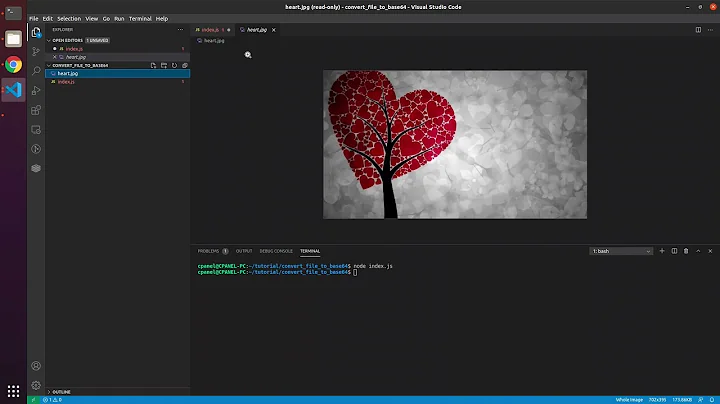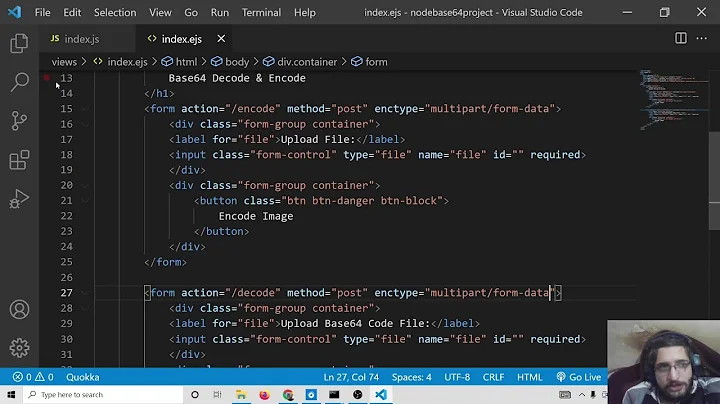Node.js get image from web and encode with base64
Solution 1
BufferList is obsolete, as its functionality is now in Node core. The only tricky part here is setting request not to use any encoding:
var request = require('request').defaults({ encoding: null });
request.get('http://tinypng.org/images/example-shrunk-8cadd4c7.png', function (error, response, body) {
if (!error && response.statusCode == 200) {
data = "data:" + response.headers["content-type"] + ";base64," + Buffer.from(body).toString('base64');
console.log(data);
}
});
Solution 2
If anyone encounter the same issue while using axios as the http client, the solution is to add the responseType property to the request options with the value of 'arraybuffer':
let image = await axios.get('http://aaa.bbb/image.png', {responseType: 'arraybuffer'});
let returnedB64 = Buffer.from(image.data).toString('base64');
Hope this helps
Solution 3
LATEST, AS OF 2017 ENDING
Well, after reading above answers and a bit research, I got to know a new way which doesn't require any package installation, http module(which is built-in) is enough!
NOTE: I have used it in node version 6.x, so I guess its also applicable to above versions.
var http = require('http');
http.get('http://tinypng.org/images/example-shrunk-8cadd4c7.png', (resp) => {
resp.setEncoding('base64');
body = "data:" + resp.headers["content-type"] + ";base64,";
resp.on('data', (data) => { body += data});
resp.on('end', () => {
console.log(body);
//return res.json({result: body, status: 'success'});
});
}).on('error', (e) => {
console.log(`Got error: ${e.message}`);
});
I hope it helps!
Also, check more about the http.get(...) here !
Solution 4
If you know the image type, it's a one-liner with the node-fetch package. Might not suit everyone, but I already had node-fetch as a dependency, so in case others are in a similar boat:
await fetch(url).then(r => r.buffer()).then(buf => `data:image/${type};base64,`+buf.toString('base64'));
Solution 5
If you are using axios then you can follow below steps
var axios = require('axios');
const url ="put your url here";
const image = await axios.get(url, {responseType: 'arraybuffer'});
const raw = Buffer.from(image.data).toString('base64');
const base64Image = "data:" + image.headers["content-type"] + ";base64,"+raw;
you can check with decode base64.
Related videos on Youtube
Aleksr9
Updated on April 16, 2022Comments
-
Aleksr9 about 2 years
I'm trying to fetch an image from the web and encode it with base64.
what i have so far is basically:
var request = require('request'); var BufferList = require('bufferlist').BufferList; bl = new BufferList(), request({uri:'http://tinypng.org/images/example-shrunk-8cadd4c7.png',responseBodyStream: bl}, function (error, response, body) { if (!error && response.statusCode == 200) { var type = response.headers["content-type"]; var prefix = "data:" + type + ";base64,"; var base64 = new Buffer(bl.toString(), 'binary').toString('base64'); var data = prefix + base64; console.log(data); } });This seems to be pretty close to the solution but i can't quite get it to work. It recognizes the data type and gives out the output:
data:image/png;base64however the bufferlist 'bl' seems to be empty.
Thanks in advance!
-
Brett Zamir almost 11 yearsJust a completely wild guess but I think it could be possible that the request() may be using a header indicating an agent that may be blocked by certain sites to minimize scraping.
-
 Sebastian vom Meer almost 11 years@BrettZamir Do you think so? Blocking a request with a 200 response seems very nasty...
Sebastian vom Meer almost 11 years@BrettZamir Do you think so? Blocking a request with a 200 response seems very nasty... -
 Sebastian vom Meer almost 11 yearsAnd may I ask: What is
Sebastian vom Meer almost 11 yearsAnd may I ask: What isrequire('request')? Cannot find it in the documentation. All I know for this is http/https. -
Brett Zamir almost 11 years@Sebastian, yes, it is just a wild guess... But it is one of those problems which has recurred for me, so just offering it as a throwaway...
-
gustavohenke almost 11 years@SebastianG, if you can't find something being required in the docs, then that means it's from...? :D
-
 Sebastian vom Meer almost 11 years@gustavohenke Sorry, I don't get it...
Sebastian vom Meer almost 11 years@gustavohenke Sorry, I don't get it...
-
-
Aleksr9 almost 11 yearsGreat it worked, thanks!. One question though, why does request not be set to any encoding? I still get some sort of result if i skip the .defaults({ encoding: null }) part.
-
Dan Kohn almost 11 years
encoding: nulltells request that you want a buffer, not a string. A string gives you unusably garbled data, as the whole point of base64 is to encode binary. I got the answer about encoding in my own StackOverflow question stackoverflow.com/questions/16619980/…, so I'm happy to pay it forward. -
Omar Meky over 9 yearsWorks fine on localhost but getting ECONNREFUSED in production. Any ideas?
-
Semur Nabiev over 6 yearsbase64.encode(<URL>, <OPTIONS>, <CALLBACK>) api reference: github.com/riyadhalnur/node-base64-image/blob/HEAD/docs/docs.md
-
 l p over 6 yearsThis works. I had to use both the http and https modules in my solution since most resources are https today. Unfortunately, you'll need to check manually which module to use. See stackoverflow.com/a/45215071/4978821.
l p over 6 yearsThis works. I had to use both the http and https modules in my solution since most resources are https today. Unfortunately, you'll need to check manually which module to use. See stackoverflow.com/a/45215071/4978821. -
 Valfar Developer over 6 yearsBest answer for me!
Valfar Developer over 6 yearsBest answer for me! -
SouvikMaji about 5 yearsSolution: Run production from localhost
-
 Dimas Crocco about 5 yearsMay all Gods bless you... I knew it was an encoding problem, but I was struggling to find how to disable it on request library...
Dimas Crocco about 5 yearsMay all Gods bless you... I knew it was an encoding problem, but I was struggling to find how to disable it on request library... -
 Nagendra Rao over 4 years@DanKohn
Nagendra Rao over 4 years@DanKohnnew Bufferis now deprecated. nodejs.org/api/buffer.html -
 Dhananjai Pai over 4 yearsThank you so much! Helped me saved a bunch of time and frustration!
Dhananjai Pai over 4 yearsThank you so much! Helped me saved a bunch of time and frustration! -
ShaneTheKing over 3 yearsI was having a lot of issues with this and axios, turns out the response type is what makes it. Thansk a lot!
-
 Casimir over 3 yearsNice and concise!
Casimir over 3 yearsNice and concise! -
 Gus over 2 yearsWorks well!
Gus over 2 yearsWorks well!.bufferhas been deprecated. This is the new way:const blob = await response.arrayBuffer(); return `data:${response.headers.get("content-type")};base64,${Buffer.from(blob).toString("base64")}`; -
kibuikaCodes about 2 yearsrequest is also deprecated








